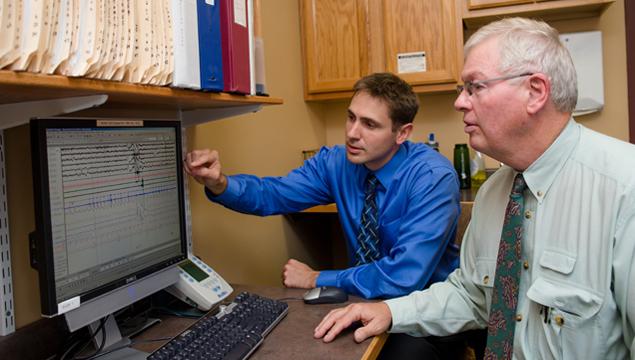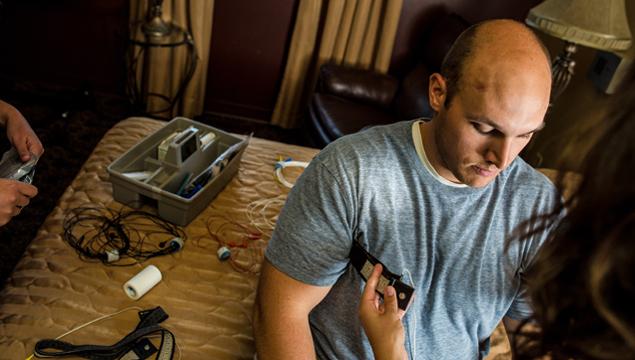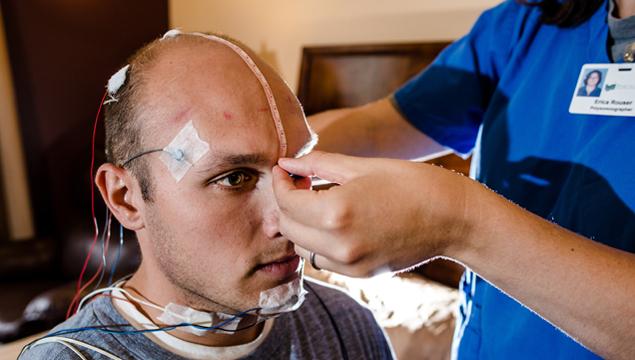Can a Good Night's Sleep Prevent Heart Disease? Exploring Sleep Apnea
Why This Project Is Important
Our ultimate goal is to provide research that will advance our current understanding of the connection between sleep apnea and cardiovascular disease—potentially garnering new lifesaving disease prevention methods and therapies. This novel work will provide a foundation for future large-scale grants.
Project Description
Almost everyone suffers from a poor night of sleep once in a while. From insomnia to sleep apnea to restless leg syndrome, it can be difficult for both adolescents and adults to fall and stay asleep. In fact, over 33 percent of adults report having a sleep disorder, and nearly 70 percent of adolescents suffer from mild to severe sleep deprivation.
Both acute and chronic sleep deprivation can increase the risk of developing cardiovascular conditions like stroke, heart failure, and hypertension, or high blood pressure. Hypertension, which affects one-third of American adults, is characterized by a series of physiological adaptations that compromise the human body's ability to maintain normal blood pressure, such as an overactive sympathetic nervous system.
Our nervous system is critically important to maintaining healthy blood pressure; we aim to see how certain stressors, such as sleep deprivation due to sleep apnea, influence the sympathetic nervous system. Our laboratory is equipped for microneurography, a highly specialized technique for examining the sympathetic nervous system in humans. Microneurography remains the only available technique to directly measure sympathetic neural traffic in humans.
We aim to study sleep apnea, one of the most prevalent sleep disorders in the world, in which patients stop breathing for long periods of time during sleep. Through additional funding, we will be able to recruit and retain sleep apnea patients; determine sleep architecture, duration, and quality using overnight polysomnography testing; and record sympathetic activity through microneurography. We also plan to assess neural cardiovascular function and sleep function before and after interventions known to improve or worsen sleep apnea—for example, exercise and alcohol, respectively.
Meet the Researcher

days left
funded
last
What Your Donation Can Help Us Do:
- Understand the connection between sleep apnea and heart disease
$1+ 17 Funders
Email with tax deducation information.
$100+ 12 Funders
Email with tax deduction info, and name listed among donors in annual report.
$250 (1/20)
Email with tax deduction info, name listed among donors in annual report, and a Michigan Tech coffee mug.
$500 (1/10)
Email with tax deduction info, name listed among donors in annual report, and a Michigan Tech T-shirt.
$1,000 (3/5)
Email with tax deduction info, name listed among donors in annual report, and a Michigan Tech polo shirt.
$2,500 (1/2)
Email with tax deduction info, name listed among donors in annual report, and a Michigan Tech sweatshirt.
Recent Donors
Some donors may be hidden.







 Gifts to projects listed on SUPERIORIDEAS.ORG are received and processed by Michigan Tech Fund. Michigan Tech Fund is a tax-exempt organization under Section 501(c)(3) of the Internal Revenue Code acting on behalf of Michigan Technological University. It is the policy of Michigan Tech Fund that a portion of the gifts and/or income therefrom may be used to defray the costs of raising and administering the funds.
Gifts to projects listed on SUPERIORIDEAS.ORG are received and processed by Michigan Tech Fund. Michigan Tech Fund is a tax-exempt organization under Section 501(c)(3) of the Internal Revenue Code acting on behalf of Michigan Technological University. It is the policy of Michigan Tech Fund that a portion of the gifts and/or income therefrom may be used to defray the costs of raising and administering the funds.